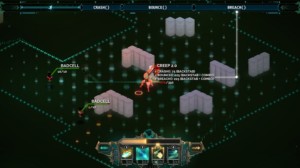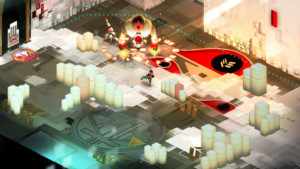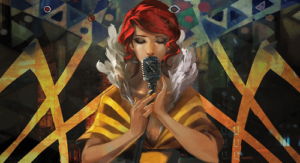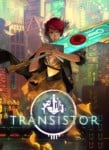 This will be the first in a series of video game reviews. My goal is to give a relatively short review about what I (dis)liked while playing through a game. First off: Transistor. This is a science fiction action role-playing game developed by Supergiant Games in 2014. It uses an isometric point of view just like it’s predecessor Bastion. This review will include some information which some may consider spoilers, so if you don’t want to be spoiled at all, stop reading now. Overall I’d rate this game as an eight on a scale of ten.
This will be the first in a series of video game reviews. My goal is to give a relatively short review about what I (dis)liked while playing through a game. First off: Transistor. This is a science fiction action role-playing game developed by Supergiant Games in 2014. It uses an isometric point of view just like it’s predecessor Bastion. This review will include some information which some may consider spoilers, so if you don’t want to be spoiled at all, stop reading now. Overall I’d rate this game as an eight on a scale of ten.
What I liked
Interesting game design
In general the game was very interesting in what mechanics it used to tell the story to you as a player. Your weapon talks to you, weapon parts are characters with their own stories to unlock depending on how you use them, you come across computer interfaces with which you can minimally interact and there are short interlude sections. I particularly enjoyed the second mechanic as that’s another reason to experiment with your weapon configuration to unlock the rest of the character stories. However the short interlude sections didn’t do much for me in terms of overall enjoyment. Probably because there were not that many of them and they were so short that they felt pretty empty.
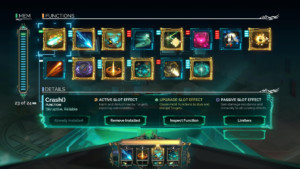
An illustration of some of the functions you can choose from. At the bottom you see your active, passive and upgrade slots.
The weapon upgrade system
It has a very original system in which you put your weapon parts in passive, active and upgrade slots to build your own custom weapons (for a lot of possible combinations!). And you can swap them around regularly around if you want. Trying out different combinations of passive’s, active’s and upgrade’s to see which worked best was rewarding. And they became available in a fast enough pace that I would continually get new stuff to play around with. One quip I had with it is that some weapons / combinations seemed overpowered and that there didn’t seem much reason to use all four active slots other than to have backup weapons (if you die one weapon slot deactivates). Also: You gain upgrades, active’s or passive’s by leveling up; however leveling up itself doesn’t increase your overall power in any way.
The difficulty level
Overall the game felt like pretty much the right difficulty to me. It was sufficiently difficult that I experimented with different combinations of weapon setups to finish battles. But not so difficult that I got stuck on any battle long. Only the last boss battle took some figuring out. And even with ten limiters active most battles were very doable. Partly though because you can outwit the AI in some cases. The AI in example ignores you if you are far enough away and doesn’t deal well with continually moving around. In that sense I wouldn’t have minded slightly higher difficulty (or some more different challenges). If you’re looking for a really tough game, this is not it.
The combat system
You can basically pause, plan a turn, execute it instantly and then you switch back to real-time while your turn timer recharges. That last period is the one in which you will get attacked, so you want your turn timer to recharge again quickly. Or you can just play fully in real-time, which is a fun challenge. It’s a very original system which I ended up preferring to the purely real-time Bastion. The fights with the enemies also didn’t feel cheap like in the X-Com: Enemy Unknown where the aliens are idiots that only start attacking you after first giving you a free turn. And they felt sufficiently different and diverse. Finally: I enjoyed the boss fights; they were generally not what you were expecting, especially the one against the second Camarata ;).
Well polished world
The whole game feels very polished in terms of graphics, characters, art, sound and level design. There are also lots of small details mixed in throughout the world to make it feel more alive and the world feels really futuristic. Simply put it’s a joy to walk through and notice all these small details. A fun note is also that you can press ‘Tab’ to have Red humm with the music that’s playing.
The achievements
I played it on Steam and pretty much all achievements (except Goodbye()) were just right. They did exactly what I feel achievements should do, namely stimulate you to experiment or explore the content of the game. Without the achievements becoming grind fests or no longer being achievable if you forget to in example pick up one upgrade somewhere.
What I disliked
The length of the game
It has a very short storyline in which you linearly go through a number of levels and bosses. I finished it pretty quickly (in roughly five to six hours). And even though I played it a second time for the rest of the achievements there was pretty much nothing new in the second run except for a few more challenges to finish. And nothing more to keep on replaying it even further.
The world building / bigger story
It was just too vague and fragmented for me. There’s a lot of interesting character / world building going on, which made me want more as I’m a fan of science fiction / fantasy and I like having to figure things out from limited information. However, most of that information is pretty hard to interpret or only hints at what’s going on and they never ended up giving me enough details. In the end the story feels as things that are just happening to me instead of as things I’m choosing to do as Red. Especially one choice she makes was initially frustrating / confusing.
Red as a character / her personal story
I didn’t really feel connected with Red during the game. All the indirect and experimental mechanics of storytelling did ok for bringing across the bigger story, but didn’t make me build a connection with Red herself / didn’t really help me connect to her personal story. This is partly because you don’t really make choices with Red as you either have only one choice or the choice has no meaningful influence. Interestingly enough I did identify with her anonymous companion, probably because he’s able to express his emotions verbally and he seems to sometimes also wonder what Red is thinking ;).
Conclusion
All in all I felt like the game is trying to bring across an interesting and engrossing story but doesn’t manage to do so as effectively as it could have been. Partly because the original storytelling mechanics it uses don’t quite work out. However, if you like originality, good visuals and interesting game design I’d highly recommend the game as it’s definitely a fun game. However, don’t expect a game you’ll be playing for ages as you’ll probably be done pretty quickly. In total I’d rate it barely a 8 out of 10, especially if you can get it for a few euro’s.
References
If you found this review interesting, check out this one. It talks about some of the same points I make here in more depth.
Here’s a no commentary playthrough of Transistor:
